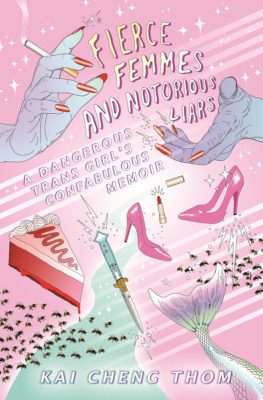It would be hard to put it more concisely or accurately than Trish Salah does on the back cover: “The first lie is that this book is a memoir, the second is that it is not.” Another way to say it might be to use Audre Lorde’s evocative term “biomythography.” Fierce Femmes and Notorious Liars by Kai Cheng Thom is a book that uses its warmhearted critique of the conventional tropes of the trans memoir as a way to reinvent those very tropes in fabulist Technicolor. It effortlessly changes the rules, cracking open a space of freedom, the kind of freedom that can only come from entering a game already in play and breaking each played-out rule with greater and more playful impunity. A dark fairy tale told by a “notorious liar.”
It begins with the very first line: “I don’t believe in safe spaces. They don’t exist. I do, however, believe in dangerous stories.” After a list of the many glamorous, dangerous stories that might be conjured, including those “that made your poor starving grandfather cross an entire ocean in search of the unbelievable riches someone once told him were waiting on the other side,” the first page ends with a question: “Where are those kinds of stories about trans girls like you and me?” This question strongly suggests who this book is written for, and its mile-a-minute engagement with its desired audience is one of its greatest strengths. But, of course, simply because it is such a thrillingly pleasurable read, Fierce Femmes and Notorious Liars can’t help but also be a book for any thoughtful reader who chooses to pick it up.

Fierce Femmes and Notorious Liars
A Dangerous Trans Girl’s Confabulous Memoir
Kai Cheng Thom
Metonymy Press
$16.95
paper
200pp
9780994047137
One of the joys of Fierce Femmes and Notorious Liars is not knowing what might happen next, so I’m not going to give anything away. Instead I’d like to briefly grapple with the complexity of character, and motivation, which drives so many of the relationships in this book, all conveyed with almost epigrammatic precision. These characters are simultaneously simplified types and complex realities, and often the dynamics within and between them occur so swiftly that it is only later we realize just how much emotional intensity has been expressed.
For example, when the narrator says goodbye to her sister, she reveals to readers the real reason she hadn’t announced her plans earlier: “It wasn’t because I was trying to spare her feelings. It was because I was selfish. … I had to run away into a world where she could not follow.” All of this takes place against a backdrop of giant, dying mermaids. “It was because I was selfish.” How many of us are so honest with our secret selves during such dramatic moments? This “notorious liar” might lie to others but rarely lies to herself, and this tension between fantasy and self-awareness energizes so much of the prose.
I can’t end this review without mentioning the strikingly gorgeous cover art by Samantha Garritano. It screams “this book is something different from every other book on the shelf.” They say you can’t judge a book by its cover, but in this case you can.






0 Comments